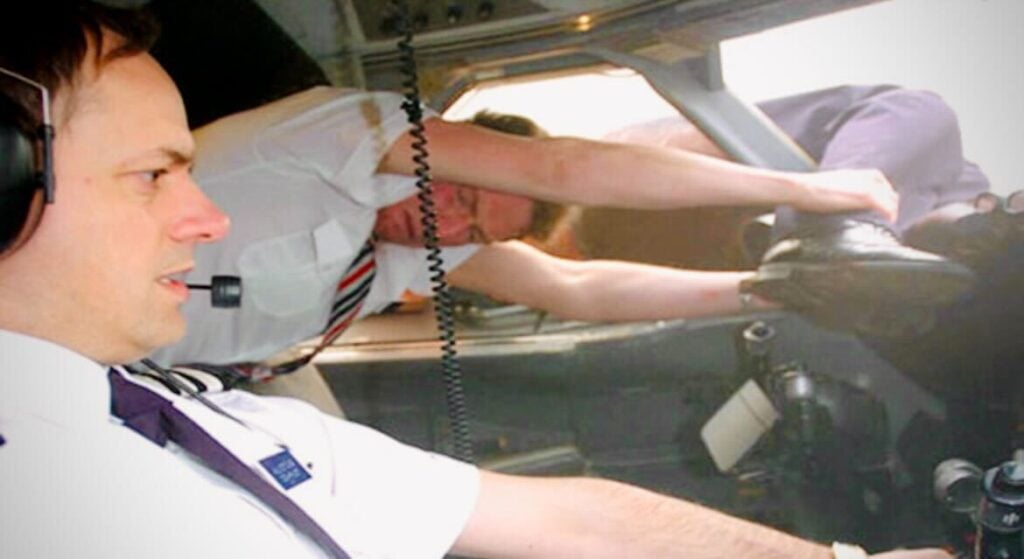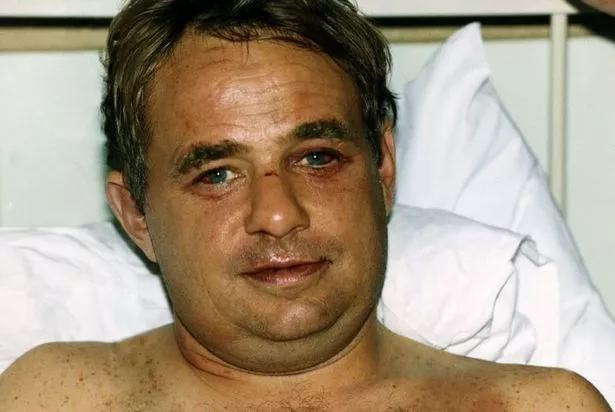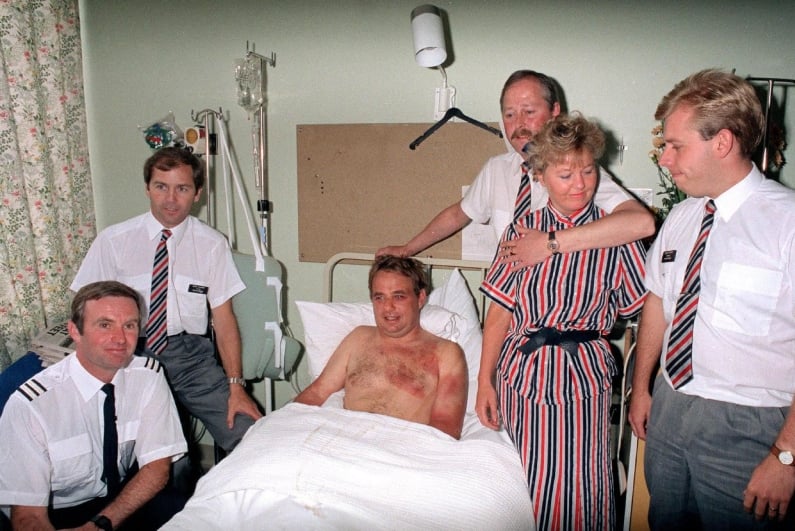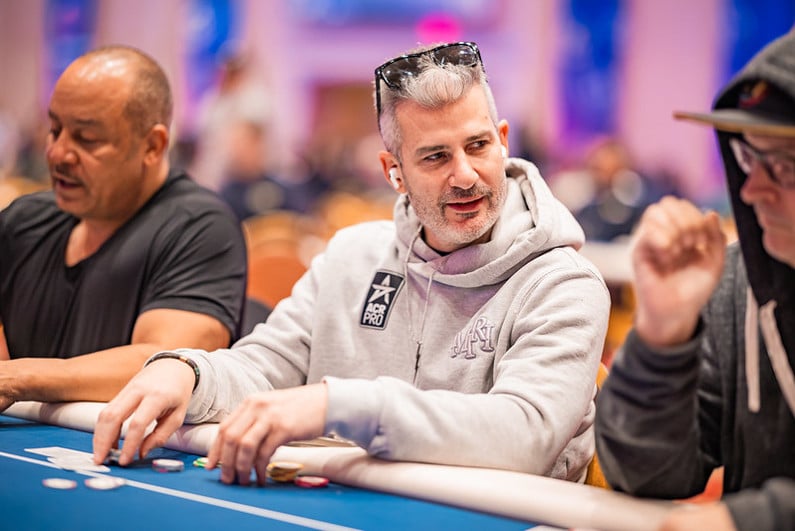Flight 5390
On June 10, 1990, two of the six cockpit windows on British Airways Flight 5390 from Birmingham to Malaga exploded mid-flight at an altitude of 17,300 feet. The resulting sudden decompression of the cabin caused a massive rush of air, which sucked the unbelted Captain Tim Lancaster out of the cockpit with only his lower legs remaining inside the plane. His feet had jammed against the controls, preventing his certain death but also forcing the plane into a steep dive.
43-year old Lancaster was an experienced pilot with over 11,000 total flight hours. His co-pilot First Officer Alastair Atchison was less experienced but he reacted quickly to the emergency as did flight attendant Nigel Ogden who just happened to be entering the cockpit when he heard the loud bang of the windows blowing out. Seeing Lancaster partially sucked out, he grabbed onto his legs and, with the help of other cabin crew members, pried them away from the controls. Atchison was able to bring the aircraft out of its nosedive and he began a treacherous rapid descent in gale-force winds.
Ogden held onto his beleaguered colleague whose status was unknown
As a fine mist filled up the cabin and the temperature dropped rapidly, air traffic control gave permission for an emergency landing in Southampton airport, 15 minutes away. Atchison focussed on keeping the plane steady at an altitude where the air was breathable while Ogden held onto his beleaguered colleague whose status was unknown.

As the minutes ticked away, Ogden’s exposed face and hands began to freeze from the severe cold and Lancaster was slipping further and further out the window with his head repeatedly slamming against the fuselage. Most of the crew thought that he was already dead, but even if that was true, the danger was that if Ogden let go, his body could collide with the plane’s engine, wing, or stabilizer, putting the lives of the 87 passengers and crew in even more peril.
Downswinging
I am currently on a downswing and whenever I’m on a downswing I think of this story. It’s an extraordinarily vivid example of people being strong, staying composed, and remaining logical in a crisis. Through no fault of their own (the bolts on the windows installed that same day were the wrong size), they are thrust into a dangerous situation and, under immense pressure, they make a series of choices and, in Ogden’s case, demonstrate remarkable personal fortitude and willingness to take pain.
my sharkscope graph plummeted faster than British Airways Flight 5390
An ability to take pain is an important poker trait. The game can be brutal and downswings can play tricks on your mind. I am proud to say that, in 18 years, I have never booked a losing one but there have been plenty of grim 2-4-month periods where my sharkscope graph plummeted faster than British Airways Flight 5390.
I am fully cognizant that most of the players I know have endured worse as they knowingly game-select for a wilder ride on poker’s rollercoaster. I don’t possess their constitutions so I am nittier in a variety of ways – smaller average field sizes, strict adherence to Kelly Criterion, and a general game-style that is tighter. Nonetheless, I am not invulnerable to the capriciousness of the poker gods and for the past two months, they have been smiting me on both the virtual and live felt.
Djangos jinx?
I’m not in the least bit superstitious but if I was, it would be hard not to think that I jinxed myself with a recent article. On October 1, I penned a piece entitled The Chip Race” Poker Podcast Wants to Hear Your Bad Beat Story in which I explained that for a prolonged period of time, pocket Kings were the bane of my poker existence. The ‘Djangos,’ as I affectionately like to call them, sent me packing from so many tournaments that I started manifesting PTSD symptoms every time I saw them. The eerie regularity with which they were the cause of my demise would have challenged the skepticism of both David Hume and Pyrrhon of Elis.
Since writing that article six weeks ago, I have played 21 live tournaments and I have been eliminated with pocket Kings or by pocket Kings in 18 of them. Did my writing about those dastardly cowboys bring back the curse? Of course not. Is it a weird coincidence that is starting to stretch credulity? Abso-f*cking-lutely.
there is always another poker tournament on the horizon
The thing I have said to myself always in these spots is: ‘This too shall pass.’ A few times I have felt a bit punch-drunk and decided to cut an online session short or not re-enter a live tourney when I would normally just flick it in again. While I have undoubtedly lost EV with those decisions, there is a self-care component to waiting until you are in a better frame of mind. The one thing that is certain is there is always another poker tournament on the horizon so sitting one out when you are not feeling it is a fine choice.
The best advice that I can give, however, is to focus on the things that you can control. Do some extra study and put in some reps on your favorite poker trainer. Be process-oriented and not results-oriented. Stay composed and above all, stay rational. Get back on the horse and ride out the negative variance.
Hold on
After 15 minutes of flying with a broken window, First Officer Atchison landed Flight 5390 safely at Southampton Airport. As soon as the aircraft came to a stop on the runway, passengers disembarked while the airport and local fire services got Lancaster back into the aircraft from his position half out of the windscreen frame. Miraculously, he was alive and he was taken to Southampton General Hospital where he was treated for frostbite, bruising, shock, and fractures to his right arm, left thumb, and right wrist. He returned to work six months later.

Ogden had suffered frostbite on his face and hands. He had dislocated his shoulder and there was serious damage to one of his eyes. He eventually made a full recovery and was later honored with the Queen’s Commendation for Valuable Service in the Air. In 1992, Atchison was rightly recognized for his remarkable airmanship with the Polaris Award.
keep calm and back yourself to keep making good decisions
Downswinging is tough but it’s imperative that you keep calm and back yourself to keep making good decisions. It might sometimes feel like you are the pilot, barely tethered to the plane, ice-cold and banging your head repeatedly, wondering if you will survive. However, I like to think of the co-pilot digging deep and leaning into his training and experience to land the plane safely. I like to think of the flight attendant, absorbing the pain and holding on for dear life.




